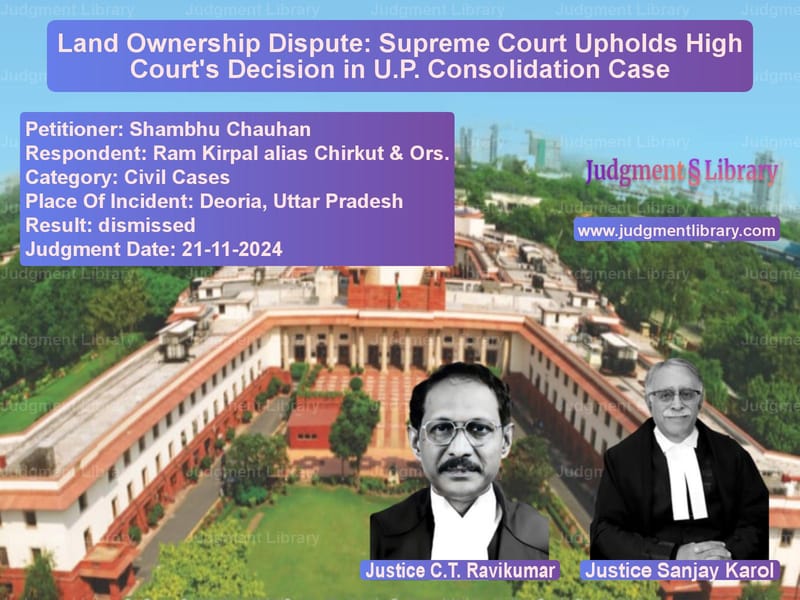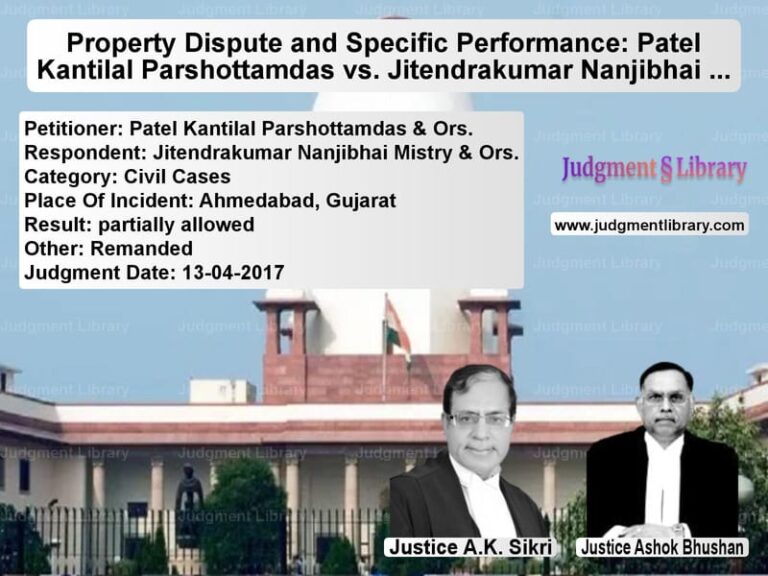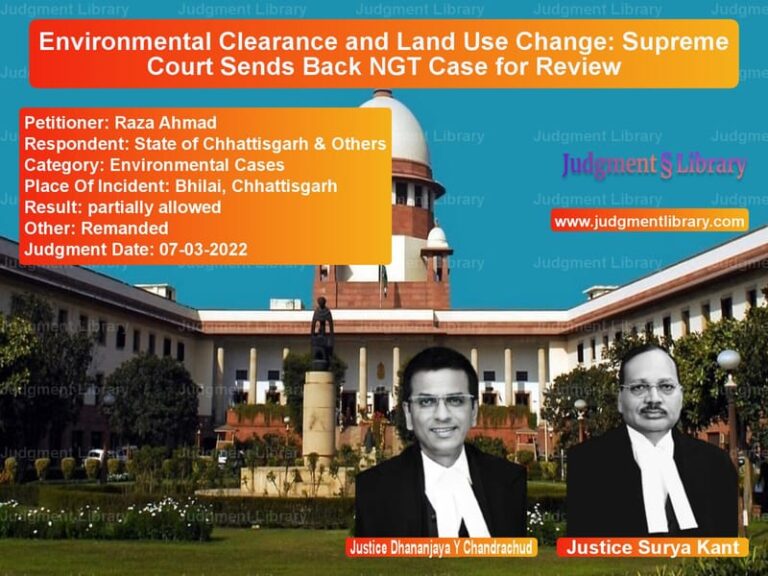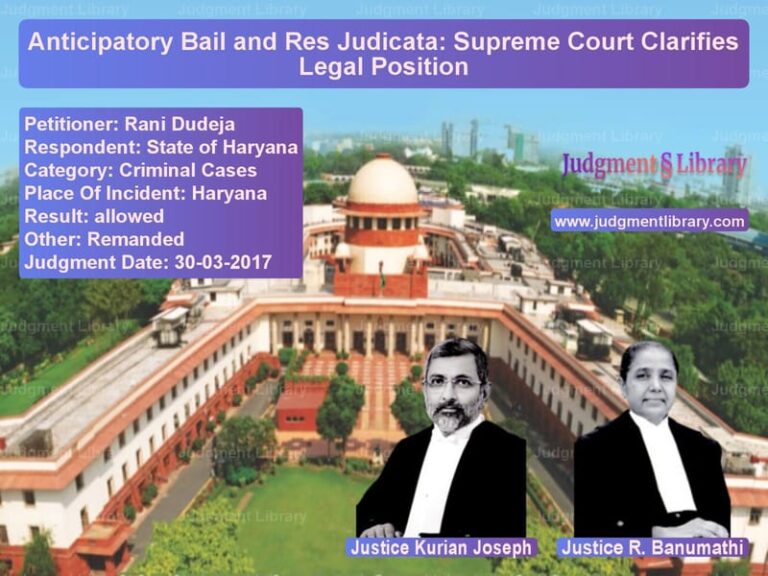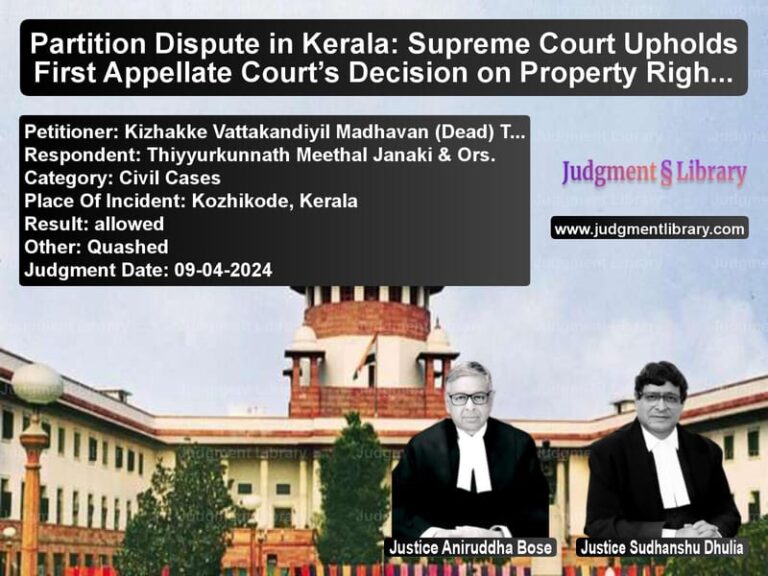Land Ownership Dispute: Supreme Court Upholds High Court’s Decision in U.P. Consolidation Case
The case of Shambhu Chauhan vs. Ram Kirpal alias Chirkut & Ors. revolves around a long-standing land ownership dispute in Uttar Pradesh. The primary issue in the case was whether Smt. Gulabi, who claimed to be the daughter of Aftee and the legal heir to certain disputed lands, could establish her right of ownership. The Supreme Court upheld the High Court’s decision, ruling against her claim, citing lack of credible evidence.
Background of the Case
The dispute centered around Khata Nos. 38 and 193 in Village Muda Dih, Tappa Deoria, Pargana Salempur Majhauli, District Deoria. The original landholders were Sehati and Bandhoo, two brothers. Bandhoo had a son named Algu, who was married to Aftee. After Aftee’s death in 1959, the land was recorded in the name of Sehati through a mutation order dated December 15, 1959. Over the years, the land continued to be recorded under the names of Jhagru, Bhusal (sons of Sehati), and Ram Kirpal alias Chirkut.
In 1973, the land was brought under consolidation operations. During this process, Smt. Gulabi filed objections under Section 9 of the U.P. Consolidation of Holdings Act, 1953, claiming she was the daughter of Aftee and, therefore, entitled to a share in the property.
Key Legal Issues
- Was Smt. Gulabi the legal heir and rightful owner of the land?
- Did the findings of the lower authorities suffer from factual and legal errors?
- Did the Revisional Authority exceed its jurisdiction under Section 48 of the U.P. Consolidation of Holdings Act?
Consolidation Proceedings
The Consolidation Officer framed key issues, including:
- Whether Smt. Gulabi was the daughter of Algu and the successor of Aftee?
- Was she in possession of the land as a Bhumidhar or Sirdar?
- Were the defendants the sole rightful owners?
- Had Gulabi’s ownership ceased under Section 210 of the Act?
After hearing evidence from both sides, the Consolidation Officer dismissed Smt. Gulabi’s claim, ruling that she was unable to prove her parentage or succession rights.
Reversal by Appellate and Revisional Authorities
However, the Settlement Officer (Consolidation) overturned this decision on August 28, 1976, ruling in favor of Gulabi. The Deputy Director of Consolidation affirmed this decision on October 1, 1981.
High Court’s Intervention
The case was then taken to the Allahabad High Court, which found multiple errors in the lower authorities’ rulings. It ruled that:
- The Revisional Authority improperly reviewed factual findings, which exceeded its jurisdiction.
- The documentary and oral evidence presented by Gulabi was unreliable.
- The burden of proof under Section 101 of the Indian Evidence Act lay on Gulabi, which she failed to discharge.
- The original order of the Consolidation Officer was correct.
Supreme Court’s Analysis
The Supreme Court upheld the High Court’s ruling, making the following observations:
1. Revisional Authority’s Limited Scope
The Court reaffirmed that under Section 48 of the U.P. Consolidation of Holdings Act, the Deputy Director of Consolidation has limited powers and cannot re-evaluate factual findings unless they are perverse or unsupported by evidence.
Read also: https://judgmentlibrary.com/legal-interpretation-of-settlement-and-gift-deeds-in-property-disputes/
“The Deputy Director of Consolidation, being a Revisional Authority, had jurisdiction to interfere with the finding on facts of the subordinate authority only when the said findings are perverse or not supported by any evidence on record or contrary to law.”
2. Lack of Reliable Evidence
The Supreme Court found that:
- Gulabi’s oral evidence was inconsistent and unreliable.
- The birth register, which was her primary evidence, contained discrepancies and was not properly authenticated.
- No independent witnesses were examined to support her claim.
The Court noted:
“The High Court rightly observed that the birth register did not inspire confidence, and there was no corroborative evidence from relatives or close associates to establish her claim.”
3. Long Delay in Raising the Claim
The Court emphasized that from 1959 to 1973, Gulabi never challenged the mutation order. The unexplained 14-year delay was a significant factor against her claim.
“The belated challenge is afflicted by delay and laches. The law discourages stale claims where no reasonable justification for the delay is provided.”
Supreme Court’s Verdict
The Supreme Court dismissed the appeal, holding that:
- The High Court was correct in overturning the lower authorities’ findings.
- The Consolidation Officer’s original order rejecting Gulabi’s claim was legally sound.
- There was no credible evidence to support her claim of inheritance.
- The Revisional Authority exceeded its jurisdiction by improperly reviewing factual issues.
Accordingly, the Court restored the Consolidation Officer’s original ruling and dismissed the appeal.
Conclusion
This judgment reinforces the importance of clear and credible evidence in land inheritance cases. It also highlights the limitations of revisional authorities in reviewing factual findings and the legal consequences of long delays in raising inheritance claims. The ruling upholds the sanctity of consolidation proceedings and ensures that property disputes are resolved based on strong legal principles.
Petitioner Name: Shambhu Chauhan.Respondent Name: Ram Kirpal alias Chirkut & Ors..Judgment By: Justice C.T. Ravikumar, Justice Sanjay Karol.Place Of Incident: Deoria, Uttar Pradesh.Judgment Date: 21-11-2024.
Don’t miss out on the full details! Download the complete judgment in PDF format below and gain valuable insights instantly!
Download Judgment: shambhu-chauhan-vs-ram-kirpal-alias-chi-supreme-court-of-india-judgment-dated-21-11-2024.pdf
Directly Download Judgment: Directly download this Judgment
See all petitions in Property Disputes
See all petitions in Succession and Wills
See all petitions in Landlord-Tenant Disputes
See all petitions in Judgment by C.T. Ravikumar
See all petitions in Judgment by Sanjay Karol
See all petitions in dismissed
See all petitions in supreme court of India judgments November 2024
See all petitions in 2024 judgments
See all posts in Civil Cases Category
See all allowed petitions in Civil Cases Category
See all Dismissed petitions in Civil Cases Category
See all partially allowed petitions in Civil Cases Category

